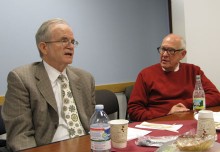ProPublica’s Paul Steiger says smaller news outlets have advantage in changing industry

March 26, 2013 – Paul E. Steiger, executive chairman of ProPublica’s board of directors, spoke to the Shorenstein Center about the past and present of the journalism industry, and ProPublica’s role in its future.
Steiger, a former reporter and editor for the Los Angeles Times and Wall Street Journal, recalled that his time at those news organizations were characterized by large profit margins, huge multi-city networks, and “ever increasing ad revenues,” even when circulation remained flat. There was a high “barrier to entry,” and so fewer organizations were able to publish.
In contrast, he said, now there are little to no barriers to entry – anyone can blog and be published due to new technology. The current ecosystem of journalism “is characterized by constant change,” he said, and that change is “driven by the next big idea.” As a result, the legacy news organizations are important but not the driving force they once were. Instead, smaller outlets have the advantage of being able to move quickly with changing ideas and trends, all while providing convenience at a low cost to consumers. However, a disadvantage of the current system is the high risk involved and the shrinking budgets available to sustain quality information and foreign bureaus, he said.
ProPublica’s goal, Steiger said, is to “shine a spotlight on abusive authority, and to uphold the public’s interest.” As a founding editor-in-chief, CEO and former president of ProPublica, Steiger said that when they launched, they were flooded with 1,400 resumes for only 17 positions, and they were able to offer competitive pay to experienced journalists from larger news organizations.
Partnerships have also been important to ProPublica’s success, Steiger pointed out, citing examples of collaborative projects with large platforms like National Public Radio and 60 Minutes, and smaller outlets like the Albany Times Union.
Why has ProPublica remained a nonprofit? Steiger’s answer is that the journalism they’ve chosen to do “is the slice that was the most expensive part of a news organization’s budget.” The high cost of investigative journalism can’t be recovered by syndication, he said. However, the lasting effects of their work “goes far beyond the readers.” He describes the work ProPublica does as providing “a pubic good” that brings a larger benefit to society.
Article and photo by Janell Sims, Shorenstein Center.